Ordering a custom cover can be a bear of a task. First you need to decide whether a custom cover is necessary, then you have to measure your pool and then hope beyond all hope that you did it right. This can be a lot to ask from a new a pool owner doing this for the first time. So I figured I would walk you through the different sections of our custom pool safety cover form to make sure your custom cover measurement and installation go according to plan.
Contact Information

Fill in your shipping and contact information so we can estimate any taxes or extra shipping fee (custom covers include free shipping in the 48 contiguous states). Your email is needed so we can forward the official quote to you. If we have a question about your measurements, we either email or call you, so make sure these are accurate.
Cover Type
There are two categories of pool safety cover – mesh and solid. However, within those categories there are different grades of material. Below is a breakdown of the pros and cons of each.
Mesh
Standard Mesh
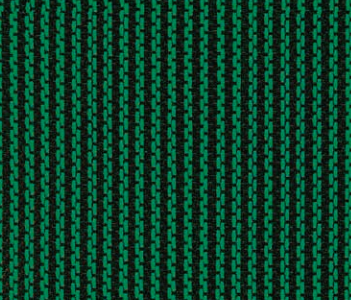
- A 12-year warranty with 5×5 spacing and a 15-year warranty with 3×3 spacing
- Drains water the quickest, no lingering puddles
- Ideal for areas that experience heavy snow or rain
- Available in most colors: green, blue, black, tan and gray
- Lightweight
- Most affordable
- Blocks only 90% of sunlight, increasing algal growth
- The wider mesh allows the most sunlight and dirt particles
- Spring start-up is more intensive
Bloc 95 Mesh
- A 12-year warranty with 5×5 spacing and a 15-year warranty with 3×3 spacing
- Increased UV protection compared to the Standard Mesh
- Less expensive than the Bloc 99
- Quicker draining than the Bloc 99
Bloc 99 Mesh
- A 12-year warranty with 5×5 spacing and a 15-year warranty with 3×3 spacing
- Blocks 99% of sunlight, dramatically reducing algae
- The tight weave allows only the smallest of dirt specks through
- Double heavy-duty springs
- Only for use in areas with little to no snow
- Water drains slower due to tighter weave mesh
Solid
Standard Solid
- A 10-year warranty with 5×5 spacing and a 12-year warranty with 3×3 spacing
- Non-porous mesh, reinforced vinyl shield to make a watertight seal
- Less chemicals needed for pool season start-up
- Heavier than the AquaMaster
- Not ideal for pools that experience snowfall
AquaMaster
- A 10-year warranty with 5×5 spacing and a 12-year warranty with 3×3 spacing
- Eliminates sand, silt and water (covers without drain panel)
- Color does not fade
- 200% stronger than vinyl solid covers
- 50% lighter than vinyl
- Uses ArmorKote technology to prevent pinholing and deck staining
- Easy spring start-up
- Requires drainage, either mesh panel or cover pump
- The most expensive
Drain or Pump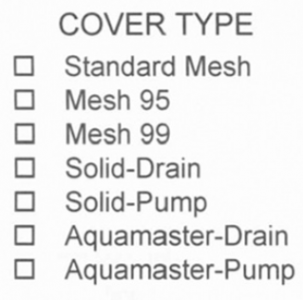
The AquaMaster and solid covers come with an option for a built-in mesh drain in the center or a completely solid cover that comes with a pump to prevent sagging and dirty water puddles as these covers do not naturally drain standing water.
Mesh Drain
To avoid standing water, the solid and AquaMaster covers are available with Mesh 95 drain panels. The Mesh 95 panel allows for steady draining of water and whole blocking of most sunlight and dirt particles.
Though the drain uses Mesh 95, pool owners who are anxious about water run-off and dirt tend to go with the second option, namely the cover pump.
Pump
Solid covers without a mesh section completely block all sunlight, and most dirt and water. But with that super secure seal on your pool, you face a new problem – standing water. The cover pump is placed in your cover’s puddles to remove standing water via an attached garden hose.
The cover pump’s downside is the pool owner’s need to be more vigilant during the off-season. Standing water puddles are magnets for dirt and leaves that if left to sit will degrade the material. These are not a set-it-and-forget-it type of deal.
Cover Color

Color choice is strictly the customer’s preference and does not affect the cover’s durability. As you can see, some covers are only available in blue or green, while the base standard mesh is available in every color, even the coveted black.
Strap Spacing
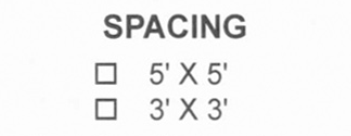
The strap spacing of a cover refers to the distance between anchor straps. The standard strap spacing for a rectangle or more common specialty pool shapes like ovals, standard Ls and Grecians are 5×5. The 3×3 is only necessary for free-form pools, whose curvy pool edge requires the cover to be more contoured. The more curves a cover must contort to, the tighter the straps have to be to prevent a slack cover edge that can catch wind and buffet. When a cover starts to buffet it looks like there is a bunch of invisible kids jumping on the cover. It may look fun, but this damages the cover and could lead to an anchor breaking loose.
You can request that a cover be made with 3X3 spacing, but it ups the price significantly.
Anchor Type
- Concrete – standard concrete pool deck, at least four inches thick
- Wood Deck – mainly on above ground pools with full wood decks
- Brass Anchor Collar – an ornamental picture of any of the anchors, gives a more professional look
- Interlocking Stake – brick paver or concrete decks, less than four inches thick
- Lawn Stake – bare ground
Step Location
If your pool has a step, here is where you will note the location (left or right,) size and whether the step is edge, flush or offset from the pool corner. If your step is offset, provide the length of deck between the edge of the pool step to the closest pool corner.
Deck & Deck Features
This section has four parts: deck width, type, diving location, and non-moveable railings. The reasons we need to know this:
- Deck space – A safety cover strap requires 36 inches of decking to tension the springs and suspend the cover over the pool. If your deck width is shorter than 36 inches, please note on the drawing of your pool shape that measurements are shorter than 36 inches.
- Deck type – When measuring 36 inches from the pool deck, also take note of the surface. This will determine what type of anchors is needed for the application.
- Diving board – If your diving board is closer than 18” to the pool’s edge, the cover may require a Y-strap to anchor the section properly.
- Non-removable objects – This includes rails, ladders, waterfalls and spas. If it hangs over the pool’s edge or is within 18 inches of the pool edge, mark it down.
Pool Shape & Size
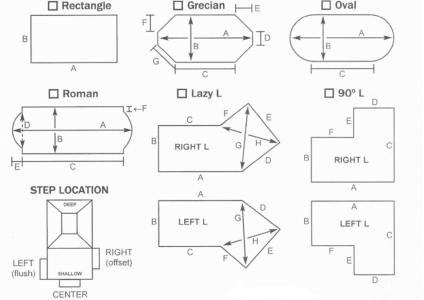
This is where we get to the good stuff, namely the measuring of the pool. There are six common pool shapes listed, with assigned letters corresponding to necessary measurements. List the pool dimensions on the spaces to the left. If you own a free-form pool, we have something very special for you (insert evil laugh), skip to the next section called A-B measurements.
Measuring a pool is generally a two-man job and can take as little as five minutes or an hour, if you have a free-form.
Tips for the tricky shapes
- Oval – The ‘C’ length is a measurement of the straight on the side of the oval. Measure only the straight length of the oval, before the end starts to curve.
- Roman – The ‘D’ is the width of the rounded portion of the pool end. Do not include the straight lengths on either side, these are to be listed on the ‘F’ length.
- Lazy L & Standard L – The ‘H’ and ‘G’ are hard because it must be pulled taut over the pool to get an accurate measurement. You may want to call over a third person to help with these two.
A-B Measurements
The process of A-B measuring your pool is a system of measuring that triangulates the twists and turns of your pool deck. I know that sounds difficult, but with a good helper and a long measuring tape you can make quick work of it.
The Essentials to Safety Cover A-B Measurements
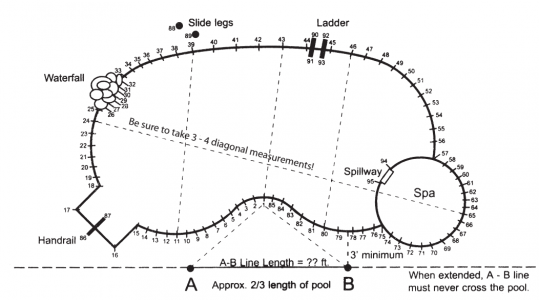
- Draw a chalk line that’s approximately two-thirds the length of the pool along the long side of the pool. Label one end of the line ‘A’ and the other ‘B’.
- For example, if your pool is 36 feet long, the line would be about 24 feet long.
- The A-B line must be a minimum of three feet from the pool’s edge.
- Using chalk, mark a line every three feet around the pool’s edge, mark every one to two feet for sharp corners or curves. Number each mark in sequential order.
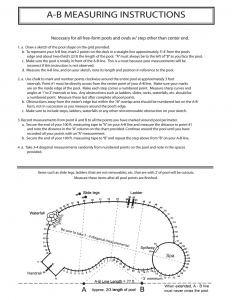
- After the pool perimeter is numbered, mark each non-removable obstruction that is within 18-inches of the pool’s edge. Obstructions to be noted and measured are diving boards, slide legs, attached spas, rails, and ladders.
- Measure from point ‘A’ to point one, then point ‘B’ to point one. Record measurements on the A-B form.
- Make three to four diagonal measurements across the pool, noting which numbered marks you are measuring from.
For in-depth steps on how to complete A-B measurements for a safety cover, view the image to the right.

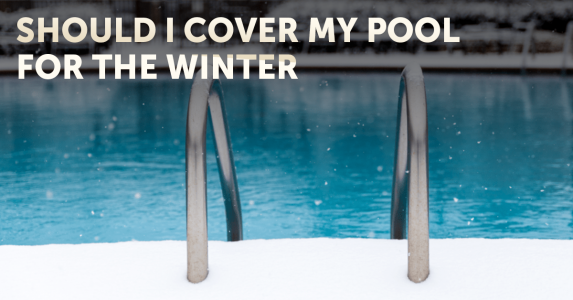

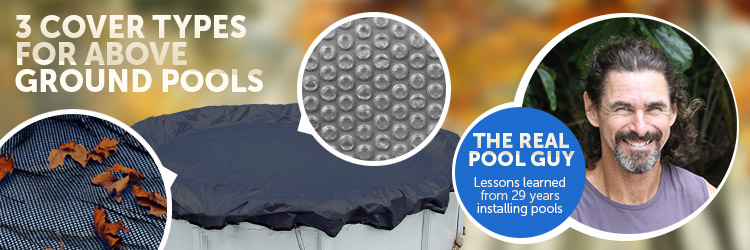
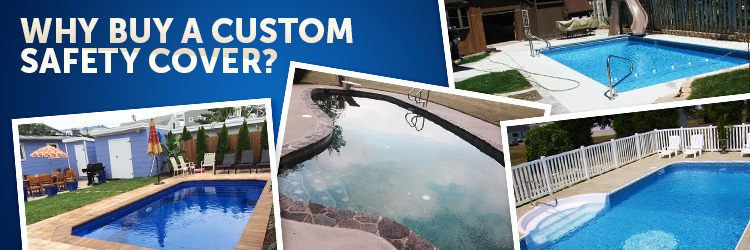






Hey Boss, how long after you send your measurements in do you get a quote back? I’m just wondering, because it sent mine in on Sunday. I know y’all are busy, and I’m not rushing anyone, but I don’t even know if you got my paperwork, and I don’t see an estimate of how long it normally takes in the instructions. Thanks for your help.
We sent the quote via email on 10/27. The turn around time for a custom quote is about 1-2 business days.
Great Info and form.
Do yo have a recommended installer in Birmingham, Alabama?
How much is the charge for installation?
Thanks.
We do not have a preferred installer network, but you can do the standard google search for safety cover installers in your zip code. Most pool companies should provide a safety cover installation service, then use the google, yelp and local reputation reviews as a gauge on the best option.
As for the cost of the installation, that would be a question for the installer you choose.
We have a 16 X 33 oval pool, which I believe is a standard size, with a wood deck around the whole pool. Does the safety cover come in a standard size? What is the normal overlap of a safety cover?
Safety covers in a range of sizes, but the stocked covers are only designed for square inground pools. These covers also come with a cement anchors. Because your pool is oval, has a wood deck and may have some other non-standard points you would require a custom cover.
The safety cover requires 36-inches of deck around to pool to anchor it properly. If you do not have that much deck, then you would need to note that on the measuring form as well.